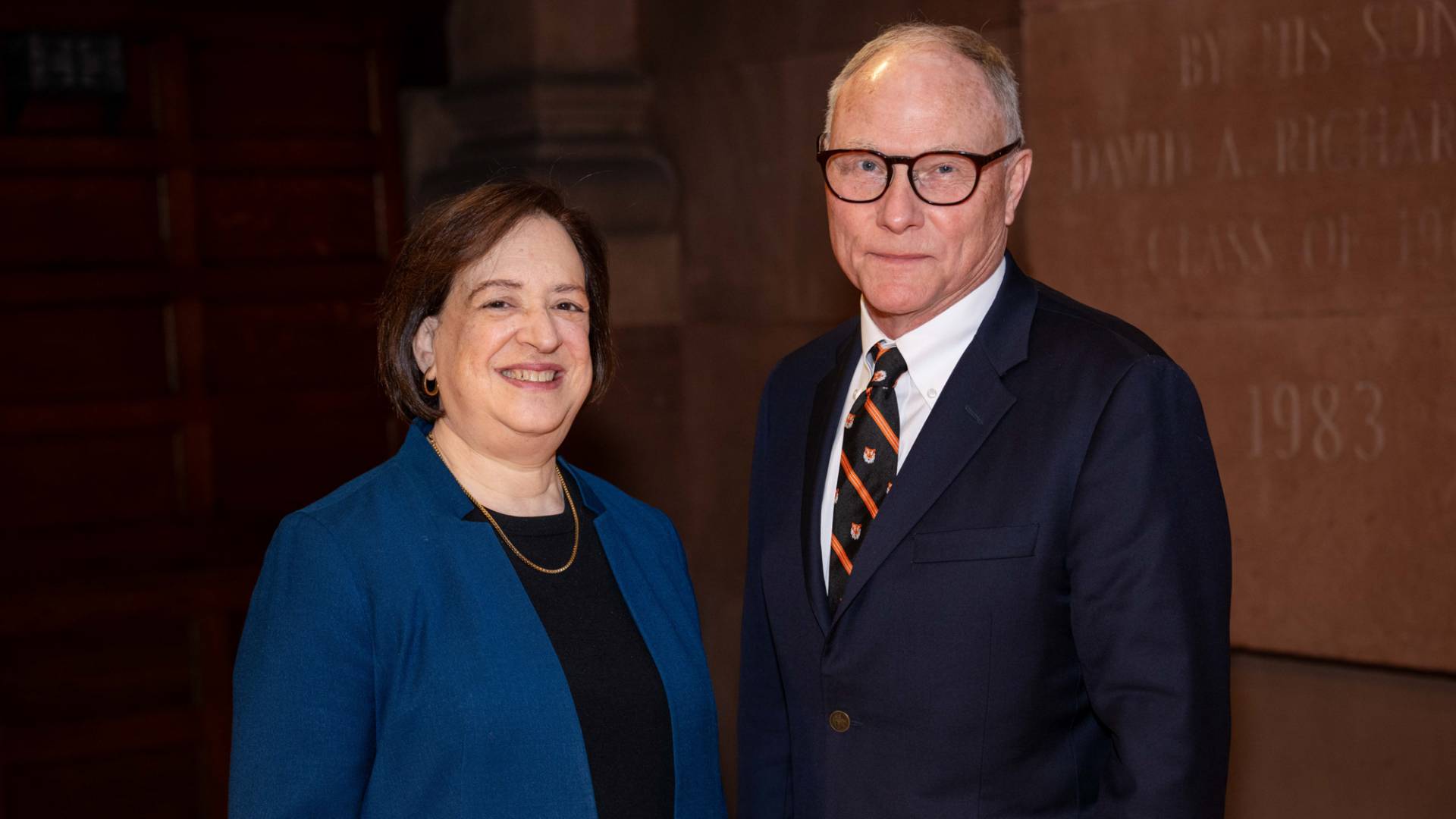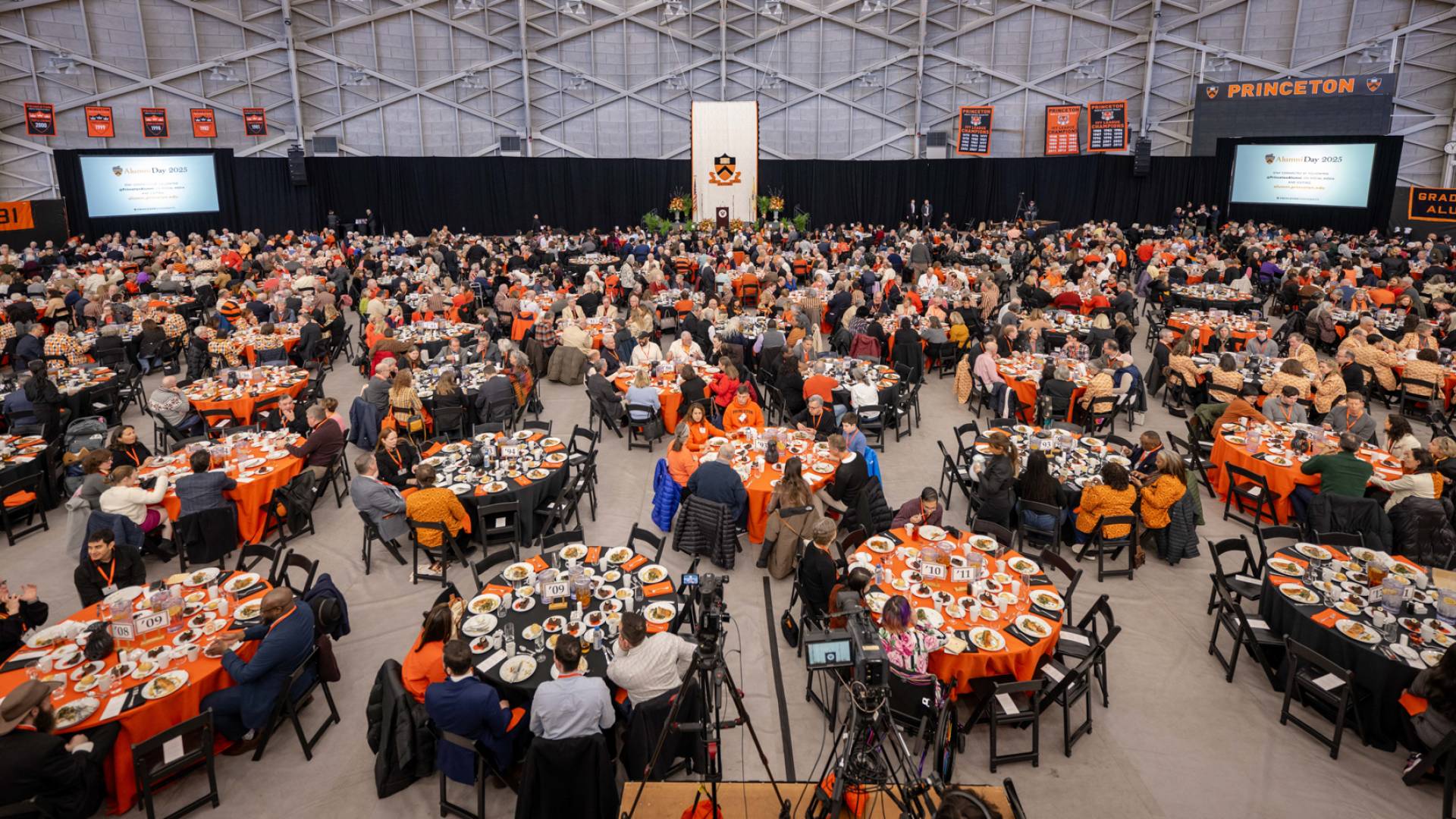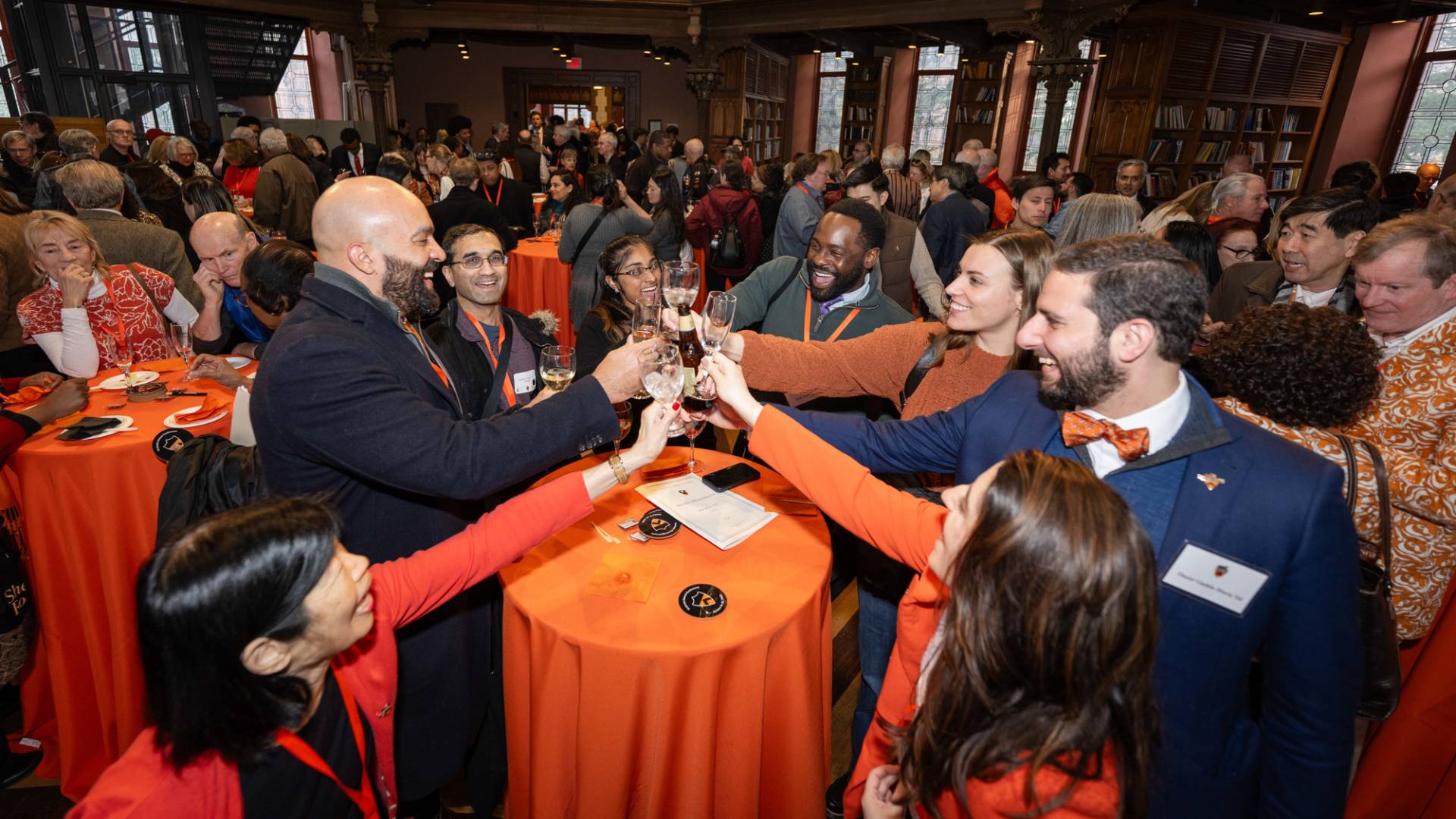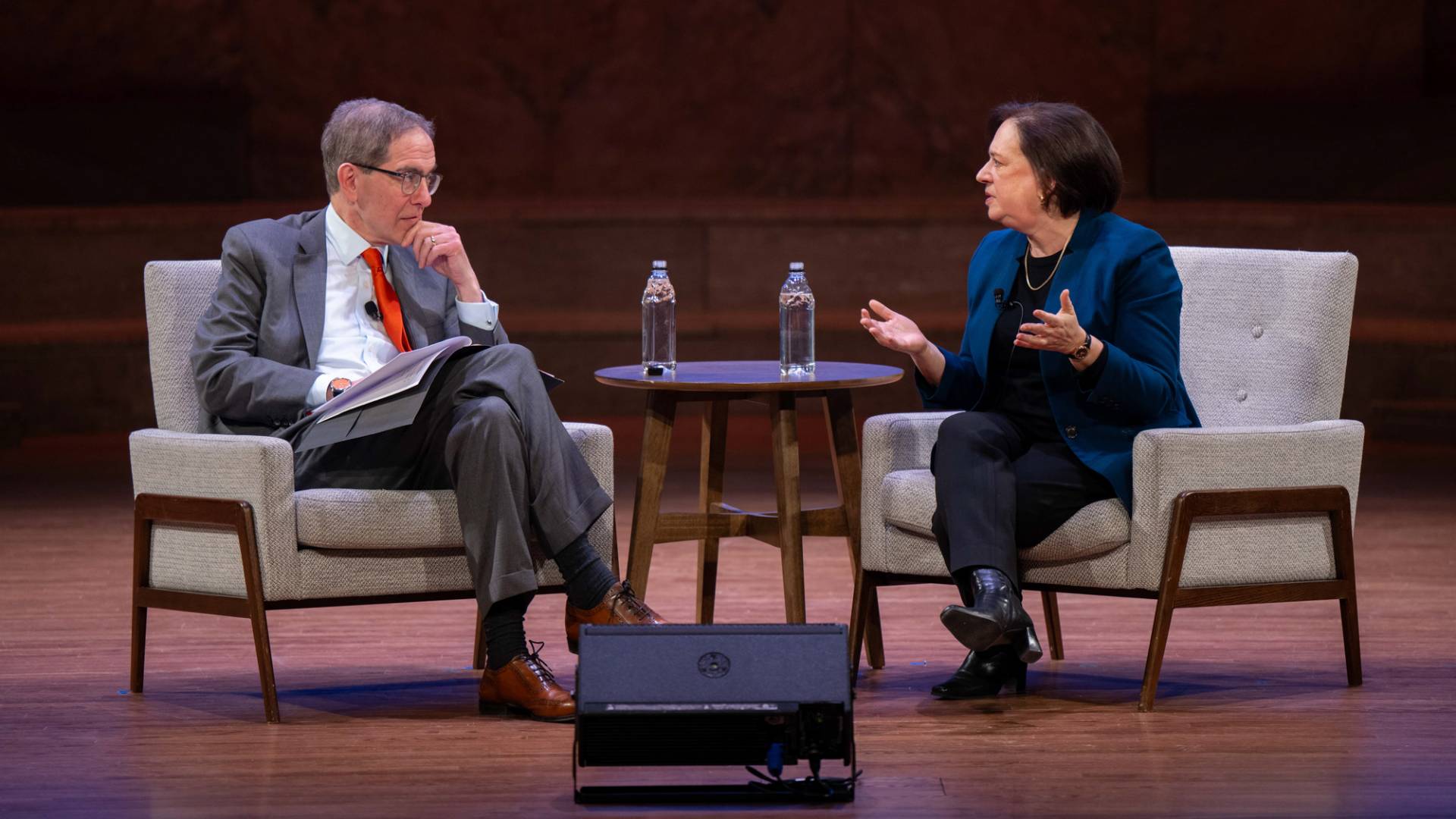Elena Kagan (left), associate justice of the Supreme Court, and David Card (right), a Nobel Prize-winning economist, received top alumni honors from Princeton.
Princeton gave top alumni honors to Elena Kagan, associate justice of the U.S. Supreme Court, and David Card, a Nobel Prize-winning economist, at Princeton’s 110th Alumni Day on Saturday, Feb. 22, in a program that demonstrated the University’s commitment to serving the nation and humanity in myriad ways.
During the morning ceremony inside a packed Richardson Auditorium, Kagan, who graduated in 1981 with a bachelor’s degree in history, received the Woodrow Wilson Award for undergraduate alumni. Card, who earned a Ph.D. in economics in 1983, received the James Madison Medal for graduate alumni.
More than 1,400 alumni, faculty, staff, students and guests attended Alumni Day, an annual mid-winter gathering.
In addition to alumni awards, the daylong event included top prizes for undergraduate and graduate students, the annual Service of Remembrance memorial ceremony in the University Chapel, a luncheon in Jadwin Gymnasium and a celebration of the Association of Princeton Graduate Alumni’s 75th anniversary.
Kagan receives Wilson Award

Louise “Weezie” Sams (left), Class of 1979 and chair of the Board of Trustees, presents Justice Kagan, Class of 1981, with the Woodrow Wilson Award. The award recognizes contributions to service and humanity.
Kagan, the fourth woman and 11th Princeton alumnus to sit on the Supreme Court, received the Wilson Award for her work as a trailblazing legal scholar dedicated to justice and service.
Before being appointed to the Court in 2010, Kagan served as U.S. solicitor general, was dean of Harvard Law School, and worked as associate White House counsel and deputy assistant for domestic policy in the Clinton administration.
“Elena’s service to the nation is an inspiration to the entire Princeton community,” Dean of the College Michael Gordin, the Rosengarten Professor of Modern and Contemporary History, said in his introduction, lauding her as “a champion for justice and democracy.”
Kagan then participated in a conversation with President Christopher L. Eisgruber, who began by asking how Princeton had influenced her life and career. Kagan said the University’s informal motto of being “in the nation’s service and the service of humanity” is something that she and fellow alumni take to heart.
“It turns out that doing that is not really a sacrifice. It turns out it’s been the most meaningful part of my life,” she said. This year’s Moses Taylor Pyne Honor Prize winners — seniors Avi Attar and Jennifer Nwokeji — exemplify Princeton students who use their education to make a difference in their communities and the world, she noted.
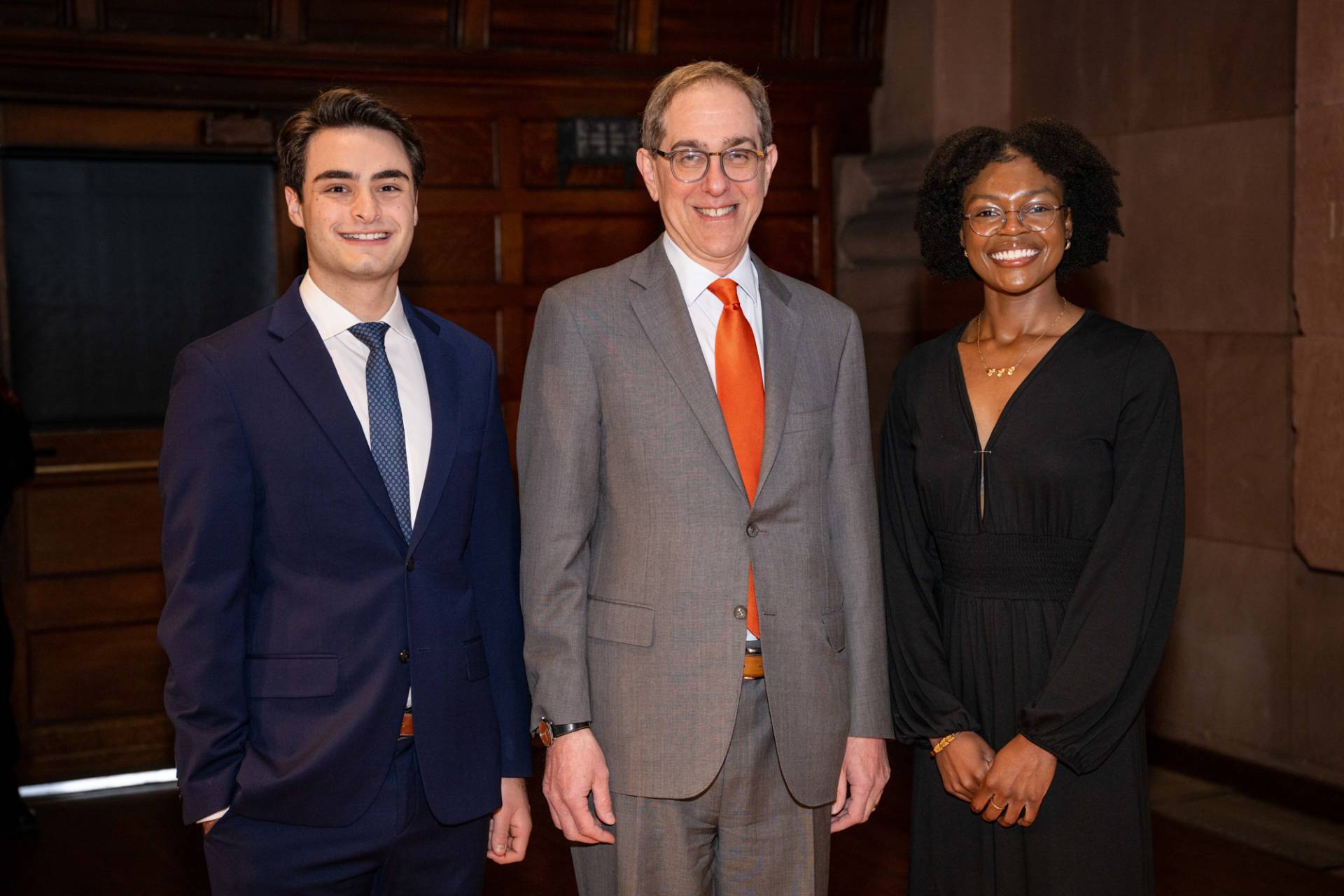
President Christopher L. Eisgruber (center) with Class of 2025 members Avi Attar (left) and Jennifer Nwokeji (right), who were honored at Alumni Day with the Pyne Prize.
Kagan also credited Princeton as the place where she learned to write well — especially as part of the Daily Princetonian’s editorial board and in writing her senior thesis. She acknowledged her thesis adviser, Sean Wilentz, the George Henry Davis 1886 Professor of American History.
Eisgruber, a constitutional scholar and former Supreme Court law clerk, also asked Kagan to talk about how the Supreme Court functions “behind the scenes.”
Kagan discussed how her approach differs when she writes a majority opinion or a dissent. Writing for the majority calls for a focus on how a new law will be applied, she said, whereas in dissents “you really don’t have that.”
“I ratchet my style up when I’m writing dissents,” she said, “because I feel sometimes it’s the style that really gets people to pay attention and to think about things.”
She also emphasized how seriously Supreme Court justices take their jobs and the court’s role in America. At the same time, she said, the public is “absolutely entitled” to have opinions about court decisions.
Eisgruber ended by asking what advice Kagan might offer today’s students.
“We have to be able to listen to other people who are saying different things and to learn from those people,” she said. Listening to opposing opinions, and sometimes questioning your own, offers a way forward, where “in the end, a polarized society can become less so.”
Card awarded Madison Medal

Sams (left) presents Card, who earned a Ph.D. in economics in 1983, with the James Madison Medal, the highest distinction for graduate alumni.
Card, a Nobel laureate and emeritus professor of economics at the University of California-Berkeley, was given the Madison Medal in honor of his groundbreaking scholarship that helped redefine labor economics. He is among a group of economists who pioneered the use of “natural experiments” to study real-world problems.
“He dedicated his career to studying immigration, wages, education, and gender- and race-related differences in the labor market to advance the world’s understanding of important policy issues and basic principles of economics,” Dean of the Graduate School Rodney Priestley, the Pomeroy and Betty Perry Smith Professor of Chemical and Biological Engineering, said in his introduction.
Card was awarded the 2021 Nobel Prize in economics for providing “new insights about the labor market.” He shared the prize with MIT economics professor Joshua Angrist, who earned his Ph.D. from Princeton in 1989, and Stanford applied econometrics professor Guido Imbens. Card’s other awards include the John Bates Clark Medal, the Frisch Medal and the Jacob Mincer Award.
In his Alumni Day talk, “The Princeton School of Labor Economics,” Card cited the late Princeton economist Alan Krueger and others. He credited the University’s Industrial Relations Section with transforming labor economics and training generations of graduate and undergraduate students who became leaders in the field, including Princeton professors such as Anne Case and David S. Lee. Card also served on the Princeton faculty, from 1983 to 1996.
Card said the “lasting lesson” of his graduate studies and teaching within the Industrial Relations Section was that "a great institution with great support and the right people can make a big difference.”
Card also discussed some of his most well-known work, such as a 1990 study analyzing how the Mariel boatlift from Cuba affected the labor market in Miami, and a 1992 study on minimum wages in the fast-food industry in New Jersey co-authored with Krueger.
During a brief question-and-answer session, one alumnus asked Card what he’s studying now, to which he responded with a range of topics, from population shifts and immigration to how familial responsibilities affect people’s behavior in the labor market.
Student awards, other alumni gatherings
The alumni awards ceremony in Richardson Auditorium also included the recognition of this year’s recipients of the Pyne Prize, the highest general distinction conferred on undergraduate students, and the Porter Ogden Jacobus Fellowship, Princeton’s top honor for graduate students.
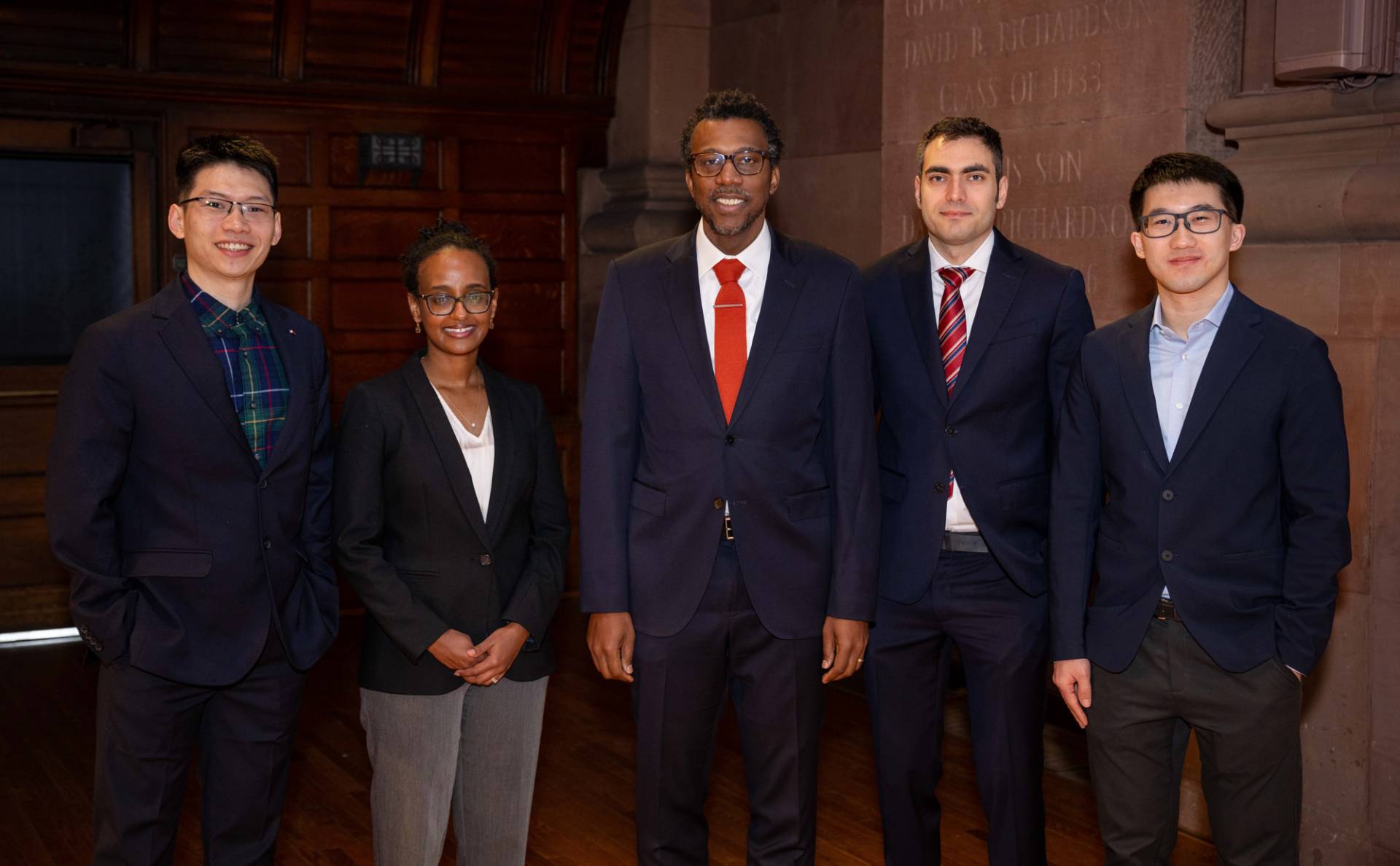
Dean of the Graduate School Rodney Priestley (center) stands with the graduate student winners of the Jacobus Fellowship (from left to right), Tung Nguyen, Rama Hagos, Pietro Cibinel and Zhiyi “Allen” Ren.
“This year’s honorees have demonstrated remarkable talent, tremendous dedication, and exceptional promise, and we are fortunate to have the opportunity to hear from them today,” Eisgruber said before recognizing students on stage.
The Jacobus Fellowship was given to Pietro Cibinel, Rama Hagos, Tung Nguyen and Zhiyi “Allen” Ren, whose research was highlighted in a video presentation.
As part of the Pyne Prize recognition, Attar and Nwokeji gave brief remarks and expressed gratitude for the family and friends who supported them and the professors and deans who inspired them.
After the morning’s award ceremony, alumni enjoyed lunch in Jadwin Gymnasium, where James Steward, the Nancy A. Nasher-David J. Haemisegger, Class of 1976, Director of the Princeton University Art Museum, gave an update on the new museum opening this fall. The luncheon, which serves as the annual meeting of the Alumni Association, also included an update from Alumni Council Chair Monica Moore Thompson, an address from President Eisgruber and performances by the Roaring 20 student a cappella group.
Alumni also had opportunities to attend varsity athletic matches, view exhibits in Firestone Library, and join various alumni group meet-ups.
